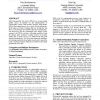Free Online Productivity Tools
i2Speak
i2Symbol
i2OCR
iTex2Img
iWeb2Print
iWeb2Shot
i2Type
iPdf2Split
iPdf2Merge
i2Bopomofo
i2Arabic
i2Style
i2Image
i2PDF
iLatex2Rtf
Sci2ools
112
click to vote
FPGA
2004
ACM
2004
ACM
An embedded true random number generator for FPGAs
Field Programmable Gate Arrays (FPGAs) are an increasingly popular choice of platform for the implementation of cryptographic systems. Until recently, designers using FPGAs had less than optimal choices for a source of truly random bits. In this paper we extend a technique that uses on-chip jitter and PLLs to a much larger class of FPGAs that do not contain PLLs. Our design uses only the Configurable Logic Blocks (CLBs) common to all FPGAs, and has a self-testing capability. Using the intrinsic jitter contained in digital circuits, we produce random bits at speeds of up to 0.5 Mbits/second with good statistical characteristics. We discuss the engineering challenges of extracting random bits from digital circuits, and we report the results of running standard statistical tests (NIST) on the output generated by our system. Categories and Subject Descriptors G.3 [Probability and Statistics]: Random Number Generation; E.3 [Data Encryption]. General Terms Algorithms, Design, Experimentatio...
FPGA | FPGA 2004 | FPGAs | Random Bits | Random Numbers |
| Added | 20 Aug 2010 |
| Updated | 20 Aug 2010 |
| Type | Conference |
| Year | 2004 |
| Where | FPGA |
| Authors | Paul Kohlbrenner, Kris Gaj |
Comments (0)

